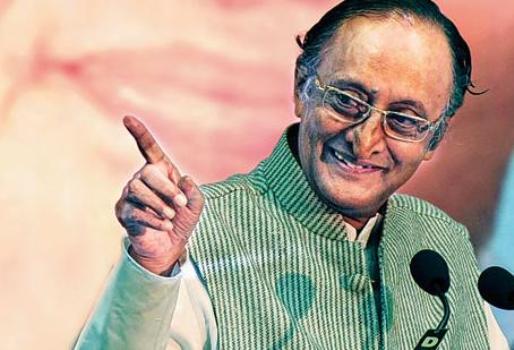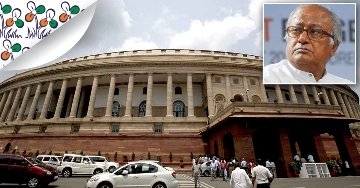Full transcript:
Deputy Speaker Sir, we oppose the Mines and Minerals (Development and Regulation) Amendment Bill that has been brought. Mr Premchandran has dealt in details with his objections. I am also a signatory to the Statutory Resolution disapproving the Ordinance. I feel the Government is actually playing with the process of the legislation. First a Law was brought in 2011, and then it was referred to a Standing Committee. The Standing Committee submitted the Report, at the time the Bill could not be passed because the Parliament was dissolved.
Now this Government introduced the Bill, then without any necessity they passed an Ordinance and after the Ordinance they have again come to this Bill. I thought that this Bill, which affects a large number of the people in the country should be taken more seriously.
Sir, I shall point out just three things. In case of mines and minerals there is an old act, 1957 Act in which there are three Schedules. In the first Schedule one is coal and lignite, part two is atomic bearing minerals and part three deals with all the mines and minerals like bauxite, chrome, copper ore, gold, iron ore, zinc, precious stone and manganese.
Now in this current Amendment a new Schedule has been brought. The fourth Schedule has taken out some minerals into a different consideration. They have said bauxite, limestone, iron ore and manganese are not included.
Now I want to point out that mines and minerals are very sensitive areas.
Sir, I also point out that I just said BJP Minister and they started shouting, so I named the BJP Minister if you want I will withdraw his name.
I am saying that exploration of minerals is a big public issue anywhere. As it happened in Karnataka, similarly it happened in the Niyamgiri Hills in Odisha, similarly iron mining by Chougules, it was stopped due to Supreme Court’s order in Goa.
Sir, the other important point, I want to point out to the Minister, that our mineral resources are in those areas where the people are the poorest. They are mostly in forested areas, hilly areas which are inhabited by tribals. The tribals are poorest.So, when we are going to exploit mineral resources, do remember the tribals.
Sir, I was just looking at the constitution, the tribal areas are called the ‘Scheduled 5’ areas and most of these mineral resources are in here. You cannot take land in Scheduled 5 areas without the consent of the Gram Sabhas of the tribals.
Lastly, one has to remember the multinationals are out to exploit India’s mineral wealth and they are targeting these tribal areas which are leading to conflict. The Maoist problem in Chhattisgarh, in parts of Madhya Pradesh, Maharashtra and Odisha, is due to attempt of the multinationals to take their areas for mineral exploration.
So when I look at this law, I do not look at it as a mere piece of legislation. I look at it with a point of view of socio-economic impact on the life and culture of these poorest people. The strange thing is places which are mineral rich, the people are abysmally poor. No exploration, no exploitation should be allowed which does not improve the condition of the people living in these areas. This should prove the bedrock of all our policies on mineral exploration.
Now let us see what the Minister in this law is actually doing. There are some very dangerous elements. One I would like to mention Sir, what is known as captive mines. Which are captive mines? Particularly iron ore, big companies own the captive mines. Now, by this law, that those who have captive mines, their lease will be extended to 2030. Those who are merchant miners, their lease will be extended to 2020. Now, you are saying that all new leases will be fixed by auction. Now the big owners, their leases will continue without any auctioning till 2030 – this is what the Odisha Chief Minister has protested against. He said end the leases from the day the law is passed, have a free auction, nobody will object to that. This is something we object too.
The second thing they are saying, have given an amendment, hence all the leases fixed by auction will be for 50 years. It was always 30 years earlier, suddenly in order to entice multinationals into auction process, they are saying you get the auction then your lease will be for 50 years. We totally oppose, no lease should be beyond 30 years, as was previously in the law.
There are some good points in the Law, for instance they have spoken of strict mineral board, in order to look after the welfare of the people staying in the mining areas.
They have another proposal, National Mineral Exploration Board from which the 2% royalty will be given to this. Now this is nothing new. Mineral Exploration has been going on scientifically in this country for 100 years. You know of a geologist called Pramathanath Bose. He first discovered the land where Tata Steel Plant at Jamshedpur is situated. He found that next pit best iron ore mines. Now, we have the Mineral Exploration Corporation of India, Public Sector Undertaking, we have the Indian Bureau of Mines, a Government organisation. We have got the Geological Survey of India, which has been doing mining and prospective for more than 150 year. Now it is not that no exploration has been done. You are suddenly saying that we are setting up a new investment board which will explore minerals. So, one is to keep in mind that suddenly opening up this whole sector to Indian and foreign multinationals, we have to take into account all the aspects, the economic aspect, the aspect of the tribal’s and the aspect of ecology and environment as was pointed out in the case of Niyamgiri.
Lastly Sir, this law tends to make punishment for illegal mining. I fully support that. Whoever does illegal mining without the approval of the Government is doing a wrong thing. But at the same time the Central Government has not followed co-operative federalism in matter of this law, which is why Mr Naveen Patnaik is very angry.
I will end by quoting Mr Naveen Patnaik. Sir, let me quote. He referred to proposed amendments under Section 30, which allows the Centre to pass an order where no order has been made by the State within stipulated time period. Odisha, which accounts to 50-70% of the countries iron ore, bauxite and chrome, is not the only state wary of this introduction of this new clause.
So, I would like to point out to the Minister that your law is a very complicated piece of Law. Instead of putting an Amendment Law, you should have brought the Law afresh. So that you do not have to refer to the original Law every time you want to find out. Please remove the Law and bring a fresh Law and let it come before the Parliament, a comprehensive one. Take care of the interest of the State, take care of the problem of the exploitation of poor and tribal people. We will support it.
Than you, Sir.


